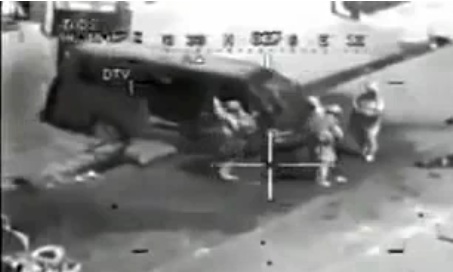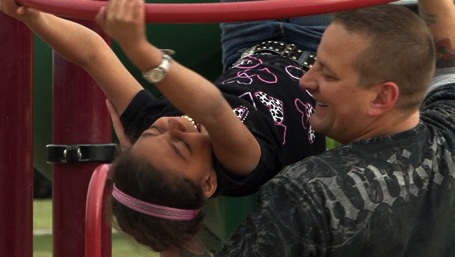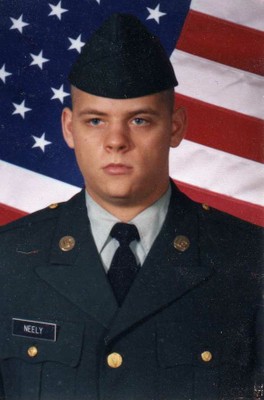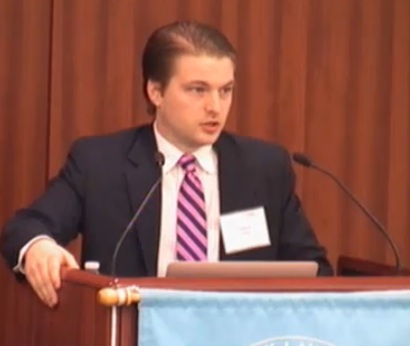Update: An edited version of the podcast is now posted along with a complete transcript of the interview with Ethan McCord.
 April 5th will mark one year since WikiLeaks first released the "Collateral Murder" video, which showed a 2007 Apache helicopter attack in Iraq. To mark the anniversary, the show's guest the show's guest was Ethan McCord, an Iraq War veteran and one of the US soldiers on the ground in Baghdad in 2007 who can be seen in the video helping to rescue children wounded in the attack.
April 5th will mark one year since WikiLeaks first released the "Collateral Murder" video, which showed a 2007 Apache helicopter attack in Iraq. To mark the anniversary, the show's guest the show's guest was Ethan McCord, an Iraq War veteran and one of the US soldiers on the ground in Baghdad in 2007 who can be seen in the video helping to rescue children wounded in the attack.
In the aftermath of the attack, McCord's superiors ordered him to stop saving the wounded. He was deeply bothered by the fact that he was the only one interested in saving lives.
McCord recently appeared in a Panorama documentary. He talked about the shooters in the video being protected and not charged with war crimes, highlighted how the US had covered up the truth of the attack prior to WikiLeaks’ release of the video and juxtaposed that dark reality with the fact that former Pfc. Bradley Manning, alleged to have leaked the video (along with other material) to WikiLeaks, is being held in solitary confinement and abused and humiliated in prison. And, McCord said after the attack he could no longer justify being a US soldier in Iraq.
 McCord has recently been going to schools to tell his story and talk to students about what it is really like to be in the military. He thinks he might have found his calling: talking to kids.
McCord has recently been going to schools to tell his story and talk to students about what it is really like to be in the military. He thinks he might have found his calling: talking to kids.
 This is our first interview in a series of interviews with former Guantanamo Bay detention camp guards and detainees.
This is our first interview in a series of interviews with former Guantanamo Bay detention camp guards and detainees.
Several current and former U.S. soldiers have expressed interest in speaking publicly about their experience at Guantanamo: including a CIA psychologist, interrogators, guards, and medical personnel. They are disgusted with what they witnessed or took part in at Guantanamo, but declined my request for an interview, because they fear opening themselves up to prosecution by the US government, which required them to sign a Non Disclosure Agreement .
I was also told that many are afraid of being prosecuted for war crimes, since low level soldiers are often the ones who shoulder the brunt of punishment and backlash; whereas higher ranking officials seem to escape scrutiny completely.
Brandon Neely, has been a vocal critic of both Guantanamo Bay, and the war in Iraq. And he speaks from experience, since he was both a guard at Guantanamo during the the first six months the camp was open, and served in Iraq during the US invasion. In the course of his advocacy, he has offered testimony to the Center for Human Rights in the Americas, and appeared in numerous articles and on television programs, including a BBC program that recounts how he contacted two of his former prisoners on Facebook to express remorse for what he did. You can also find him, where I did, on twitter, @BrandonTXNeely.
*Apologies for the first seconds of poor audio quality.
Listen to Part 1 of 8 here
Transcript
 This is our first interview in a series of interviews with former Guantanamo Bay detention camp guards and detainees.
This is our first interview in a series of interviews with former Guantanamo Bay detention camp guards and detainees.
Several current and former U.S. soldiers have expressed interest in speaking publicly about their experience at Guantanamo: including a CIA psychologist, interrogators, guards, and medical personnel. They are disgusted with what they witnessed or took part in at Guantanamo, but declined my request for an interview, because they fear opening themselves up to prosecution by the US government, which required them to sign a Non Disclosure Agreement .
I was also told that many are afraid of being prosecuted for war crimes, since low level soldiers are often the ones who shoulder the brunt of punishment and backlash; whereas higher ranking officials seem to escape scrutiny completely.
Brandon Neely, has been a vocal critic of both Guantanamo Bay, and the war in Iraq. And he speaks from experience, since he was both a guard at Guantanamo during the the first six months the camp was open, and served in Iraq during the US invasion. In the course of his advocacy, he has offered testimony to the Center for Human Rights in the Americas, and appeared in numerous articles and on television programs, including a BBC program that recounts how he contacted two of his former prisoners on Facebook to express remorse for what he did. You can also find him, where I did, on twitter, @BrandonTXNeely.
 This is our first interview in a series of interviews with former Guantanamo Bay detention camp guards and detainees.
This is our first interview in a series of interviews with former Guantanamo Bay detention camp guards and detainees.
Several current and former U.S. soldiers have expressed interest in speaking publicly about their experience at Guantanamo: including a CIA psychologist, interrogators, guards, and medical personnel. They are disgusted with what they witnessed or took part in at Guantanamo, but declined my request for an interview, because they fear opening themselves up to prosecution by the US government, which required them to sign a Non Disclosure Agreement .
I was also told that many are afraid of being prosecuted for war crimes, since low level soldiers are often the ones who shoulder the brunt of punishment and backlash; whereas higher ranking officials seem to escape scrutiny completely.
Brandon Neely, has been a vocal critic of both Guantanamo Bay, and the war in Iraq. And he speaks from experience, since he was both a guard at Guantanamo during the the first six months the camp was open, and served in Iraq during the US invasion. In the course of his advocacy, he has offered testimony to the Center for Human Rights in the Americas, and appeared in numerous articles and on television programs, including a BBC program that recounts how he contacted two of his former prisoners on Facebook to express remorse for what he did. You can also find him, where I did, on twitter, @BrandonTXNeely.
 This is our first interview in a series of interviews with former Guantanamo Bay detention camp guards and detainees.
This is our first interview in a series of interviews with former Guantanamo Bay detention camp guards and detainees.
Several current and former U.S. soldiers have expressed interest in speaking publicly about their experience at Guantanamo: including a CIA psychologist, interrogators, guards, and medical personnel. They are disgusted with what they witnessed or took part in at Guantanamo, but declined my request for an interview, because they fear opening themselves up to prosecution by the US government, which required them to sign a Non Disclosure Agreement .
I was also told that many are afraid of being prosecuted for war crimes, since low level soldiers are often the ones who shoulder the brunt of punishment and backlash; whereas higher ranking officials seem to escape scrutiny completely.
Brandon Neely, has been a vocal critic of both Guantanamo Bay, and the war in Iraq. And he speaks from experience, since he was both a guard at Guantanamo during the the first six months the camp was open, and served in Iraq during the US invasion. In the course of his advocacy, he has offered testimony to the Center for Human Rights in the Americas, and appeared in numerous articles and on television programs, including a BBC program that recounts how he contacted two of his former prisoners on Facebook to express remorse for what he did. You can also find him, where I did, on twitter, @BrandonTXNeely.
 This is our first interview in a series of interviews with former Guantanamo Bay detention camp guards and detainees.
This is our first interview in a series of interviews with former Guantanamo Bay detention camp guards and detainees.
Several current and former U.S. soldiers have expressed interest in speaking publicly about their experience at Guantanamo: including a CIA psychologist, interrogators, guards, and medical personnel. They are disgusted with what they witnessed or took part in at Guantanamo, but declined my request for an interview, because they fear opening themselves up to prosecution by the US government, which required them to sign a Non Disclosure Agreement .
I was also told that many are afraid of being prosecuted for war crimes, since low level soldiers are often the ones who shoulder the brunt of punishment and backlash; whereas higher ranking officials seem to escape scrutiny completely.
Brandon Neely, has been a vocal critic of both Guantanamo Bay, and the war in Iraq. And he speaks from experience, since he was both a guard at Guantanamo during the the first six months the camp was open, and served in Iraq during the US invasion. In the course of his advocacy, he has offered testimony to the Center for Human Rights in the Americas, and appeared in numerous articles and on television programs, including a BBC program that recounts how he contacted two of his former prisoners on Facebook to express remorse for what he did. You can also find him, where I did, on twitter, @BrandonTXNeely.
 This is our first interview in a series of interviews with former Guantanamo Bay detention camp guards and detainees.
This is our first interview in a series of interviews with former Guantanamo Bay detention camp guards and detainees.
Several current and former U.S. soldiers have expressed interest in speaking publicly about their experience at Guantanamo: including a CIA psychologist, interrogators, guards, and medical personnel. They are disgusted with what they witnessed or took part in at Guantanamo, but declined my request for an interview, because they fear opening themselves up to prosecution by the US government, which required them to sign a Non Disclosure Agreement .
I was also told that many are afraid of being prosecuted for war crimes, since low level soldiers are often the ones who shoulder the brunt of punishment and backlash; whereas higher ranking officials seem to escape scrutiny completely.
Brandon Neely, has been a vocal critic of both Guantanamo Bay, and the war in Iraq. And he speaks from experience, since he was both a guard at Guantanamo during the the first six months the camp was open, and served in Iraq during the US invasion. In the course of his advocacy, he has offered testimony to the Center for Human Rights in the Americas, and appeared in numerous articles and on television programs, including a BBC program that recounts how he contacted two of his former prisoners on Facebook to express remorse for what he did. You can also find him, where I did, on twitter, @BrandonTXNeely.
 This is our first interview in a series of interviews with former Guantanamo Bay detention camp guards and detainees.
This is our first interview in a series of interviews with former Guantanamo Bay detention camp guards and detainees.
Several current and former U.S. soldiers have expressed interest in speaking publicly about their experience at Guantanamo: including a CIA psychologist, interrogators, guards, and medical personnel. They are disgusted with what they witnessed or took part in at Guantanamo, but declined my request for an interview, because they fear opening themselves up to prosecution by the US government, which required them to sign a Non Disclosure Agreement .
I was also told that many are afraid of being prosecuted for war crimes, since low level soldiers are often the ones who shoulder the brunt of punishment and backlash; whereas higher ranking officials seem to escape scrutiny completely.
Brandon Neely, has been a vocal critic of both Guantanamo Bay, and the war in Iraq. And he speaks from experience, since he was both a guard at Guantanamo during the the first six months the camp was open, and served in Iraq during the US invasion. In the course of his advocacy, he has offered testimony to the Center for Human Rights in the Americas, and appeared in numerous articles and on television programs, including a BBC program that recounts how he contacted two of his former prisoners on Facebook to express remorse for what he did. You can also find him, where I did, on twitter, @BrandonTXNeely.
 This is our first interview in a series of interviews with former Guantanamo Bay detention camp guards and detainees.
This is our first interview in a series of interviews with former Guantanamo Bay detention camp guards and detainees.
Several current and former U.S. soldiers have expressed interest in speaking publicly about their experience at Guantanamo: including a CIA psychologist, interrogators, guards, and medical personnel. They are disgusted with what they witnessed or took part in at Guantanamo, but declined my request for an interview, because they fear opening themselves up to prosecution by the US government, which required them to sign a Non Disclosure Agreement .
I was also told that many are afraid of being prosecuted for war crimes, since low level soldiers are often the ones who shoulder the brunt of punishment and backlash; whereas higher ranking officials seem to escape scrutiny completely.
Brandon Neely, has been a vocal critic of both Guantanamo Bay, and the war in Iraq. And he speaks from experience, since he was both a guard at Guantanamo during the the first six months the camp was open, and served in Iraq during the US invasion. In the course of his advocacy, he has offered testimony to the Center for Human Rights in the Americas, and appeared in numerous articles and on television programs, including a BBC program that recounts how he contacted two of his former prisoners on Facebook to express remorse for what he did. You can also find him, where I did, on twitter, @BrandonTXNeely.
Update: Complete edited podcast is now posted for listen and download
Last week, “This Week in WikiLeaks” took the week off. The host Kevin Gosztola participated in a WikiLeaks panel at the Left Forum in New York City. I appeared with Danny Schechter, who can be found at MediaChannel.org.
The panel looked at what has been revealed by WikiLeaks and had extra significance as it happened right around the eighth anniversary of the Iraq War. Audio of my presentation and Schechter’s presentation will be posted as a podcast episode soon.
 Regular scheduled programming resumed last weekend. The show’s guest was Trevor Timm, the person behind the Twitter account @WLLegal. Timm recently helped to make possible a great Personal Democracy Forum event called, “WikiLeaks & the Law.” [Go here for video of the full panel.]
Regular scheduled programming resumed last weekend. The show’s guest was Trevor Timm, the person behind the Twitter account @WLLegal. Timm recently helped to make possible a great Personal Democracy Forum event called, “WikiLeaks & the Law.” [Go here for video of the full panel.]
The podcast is now edited and can be listened to by clicking on the widget below:
Theme by Danetsoft and Danang Probo Sayekti inspired by Maksimer